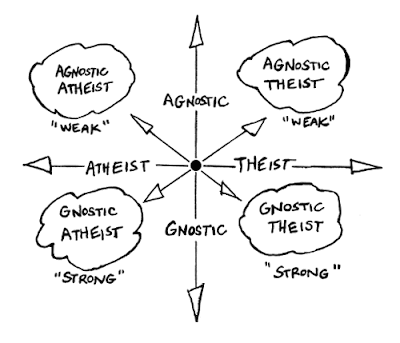Reviewing Randal Rauser's "The Swedish Atheist..." Chapter 19
Chapter 19: Why Zeus, at Least, Isn’t
God
Getting back into the thick of it, Randal begins this brief chapter with restating every assumption he can think of, affirming:
“The existence of the contingent universe is enough to show us that invoking God as an explanation is not arbitrary. Thus, being a theist does not oblige one to adopt an indefensibly complex, arbitrary view of the world. Further, reflection on the intuitively compelling definition of God as most perfect being shows that it is possible that God exist, then God must exist.”
So Randal has asserted, once again, that God is
the explanation for why there is something rather than nothing, and that God is
the most perfect being. As we saw in the chapter before, he bases such
assertions off his intuition. Intuition, which the psychologist Daniel
Kahneman showed to be highly unreliable.
Sheridan then objects that the philosophical description
of God doesn’t take us all the way to the God of the Bible, and asks Randal
what his proof is that the Perfect being is the Biblical God and not, for
example, Zeus.
Randal then says there are two ways to approach
Sheridan’s challenge. Once is to disprove Zeus, and the other is to show that
Zeus doesn’t fit the definition of God that Randal has chosen.
Randal then refreshes the reader in a bit of Greek
mythology, and goes on to ask Sheridan how far can a description vary before it
ceases to adequately refer to the thing it’s purporting to describe.
Continuing on, Randal informs that when holding
various definitions of God up to his (arbitrarily selected) definition of God,
there comes a point where a description will be so far off that it fails to
refer to the definition of God he has settled on as the correct definition for
God.
Of course, what Randal is actually doing here is
naming God, not describing God to any degree. As the language theorist Ludwig Wittgenstein
once observed, naming and describing are different things. In most cases the definitions
people give for God are not proper definitions at all. That is, they are not ‘descriptions’
of God but rather ‘names’ applied to a specific conceptualization. The religious anthropologist Pascal Boyer calls these
religious conceptualizations templates,
and identifies a list of ones which are commonly shared among the world’s religions.
Regarding these religious templates he states:
“Religious representations are particular combinations of mental representations that satisfy two conditions. First, the religious concepts violate certain expectations from ontological categories. Second, they preserve other expectations.”[1]
Boyer then gives a list of several template examples. Number
twenty-one from the list is: Omniscient God [PERSON] = special cognitive powers. This example illustrates one possible template,
and is one of many possible religious representations of God.
Now if a theologian imbues his sense of God with metaphysical
characteristics and/or attributes, such as saying that God is transcendent, all-loving,
omniscient, omnipresent, immutable, eternal, existing outside of space and time,
well, these are just the various templates which other theists and theologians will
use to check their definitions of God against.
As a consequence of having preconceived templates,
however, the religious believer hasn’t provided a reliable description of anything
and nothing has been done yet to provide a meaningful definition.
All Randal has done, in other words, is reinforce
a preferred religious template familiar to his brand of theology. Naturally,
Zeus will not match his chosen template because it is not a template derived from
Christian theology. Even talking about God as a Perfect being falls into the category of one
possible template among many. So, all it seems Randal has accomplished here is
that he has held up the Greek template for Zeus and juxtaposed it against the Christian
template for a Perfect being and observed that they are different templates. This has
nothing to say on whether one religious template is more plausible than the
next.
Randal then mentions some obscure fact about ancient
Christians believing Zeus was a demon.
Then Randal dials on his Evangelical preacher
mode, and closes the chapter with a bit of good old fashioned proselytizing.
“One thing I do know is that even if Zeus exists, he’s not the most perfect being, and that’s the only being worthy of our life’s focus.”
I’m extremely relieved that this chapter was short but, at the same time, sort of disappointed that Randal did not show how Zeus was less plausible than
Yahweh. All he established was that they were different concepts, and that the
Greek template for God didn’t match with the Christian template for God.
Furthermore, Randal
is wrong to assume that simply because the two templates differ that the Greek
one is automatically disqualified because it’s incompatible with the Christian
one. What has to happen next is we have to test the verity of each template by establishing which template, of the two, accurately
reflects reality as we know it. The one that matches reality then is most likely the right template, and
the one which doesn’t match reality will be disqualified.
In chapter 20 Randal addresses the question
whether a most Perfect being would have an imperfect church? Why would a
Perfect being require worship at all, is what I’d like to know. Maybe we’ll
find out?



Comments
Post a Comment